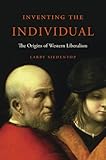Inventing the individual : the origins of Western Liberalism / by Larry Siedentop.
Material type: TextPublication details: Cambridge, Massachusetts : The Belknap Press of Harvard University Press, c2014.Description: viii, 434 p. : 24 cmContent type:
TextPublication details: Cambridge, Massachusetts : The Belknap Press of Harvard University Press, c2014.Description: viii, 434 p. : 24 cmContent type: - text
- unmediated
- volume
- 9780674417533
- 320.51 23 Si153i
| Item type | Current library | Collection | Call number | Copy number | Status | Barcode | |
|---|---|---|---|---|---|---|---|
 Books
Books
|
JSW Law Library WR General Stacks | Non-fiction | 320.51 Si153i (Browse shelf(Opens below)) | 1 | Available | A00929 |
Browsing JSW Law Library WR shelves,Shelving location: General Stacks,Collection: Non-fiction Close shelf browser (Hides shelf browser)

|

|

|

|

|

|
No cover image available | ||
| 320.45498 G9192b Bhutan : | 320.4730 C8151o The other founders : Anti-Federalism and the dissenting tradition in America, 1788-1828 / | 320.473 M3176d Democracy in America / | 320.51 Si153i Inventing the individual : the origins of Western Liberalism / | 320.53/3 Al153f Fascism : | 320.54 L5662s Storied communities : narratives of contact and arrival in constituting political community / | 320.55498 Ur11p Provisional findings of 2015 gross national happiness survey / |
Includes bibliographic references and index (p. 365-434).
Prologue : what is the West about? -- The world of antiquity. The ancient family ; The ancient city ; The ancient cosmos -- A moral revolution. The world turned upside down : Paul ; The truth within : moral equality ; Heroism redefined ; A new form of association : monasticism ; The weakness of the will : Augustine -- Towards the idea of fundamental law. Shaping new attitudes and habits ; Distinguishing spiritual from temporal power ; Barbarian codes, Roman law and Christian intuitions ; The Carolingian compromise -- Europe acquires its identity. Why feudalism did not recreate ancient slavery ; Fostering the "Peace of God" ; The papal revolution : a constitution for Europe? ; Natural law and natural rights -- A new model of government. Centralization and the new sense of justice ; The democratizing of reason ; Steps towards the creation of nation-states ; Urban insurrections -- The birth pangs of modern liberty. Popular aspirations and the friars ; The defence of egalitarian moral intuitions ; God's freedom and human freedom joinded : Ockham ; Struggling for representative government in the church ; Dispensing with the Renaissance -- Epilogue : Christianity and secularism.
"This short but highly ambitious book asks us to rethink the evolution of the ideas on which modern states are built. Larry Siedentop argues that the core of what is now our system of beliefs, liberalism, emerged much earlier than generally recognised, established not in the Renaissance but by the arguments of lawyers and philosophers in the twelfth and thirteenth centuries. There are large parts of the world--fundamentalist Islam; quasi-capitalist China--where other belief systems flourish. Faced with these challenges, understanding our own ideas' origins is more than ever an important part of knowing who we are."--Publisher's Web site.
